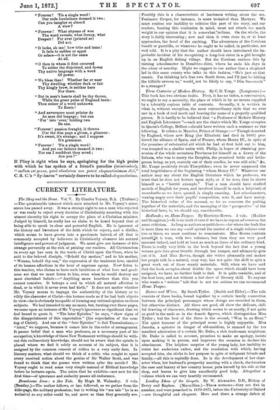CURRENT LITERATURE.
The Sling and the Stone. Vol. V. By Charles Voysey, B.A. (Triibner.) —The questionable interest which once attached to Mr. Voysey's utter- ances has passed away. It was a strange sight to see a man who rejected or was ready to reject every doctrine of Christianity asserting with the utmost sincerity his right to occupy the place of a Christian minister. Judged by himself, he really has no claim to be heard beyond that of being able to speak in clear and powerful English. He is ignorant of the history and literature of the faith which he rejects, and a dislike, which seems to have grown into a passionate hatred, of all that is commonly accepted by believers in Christianity obsoures his natural intelligence and powers of judgment. We must give one instance of this strange perversity at the risk of paining our readers. All Christendom in every age has seen in the words of Christ upon the Cross, when he said to the beloved disciple, "Behold thy mother," and to his mother, "Woman, behold thy son," the expression of the tenderest love, careful of its human affections in the hour of supreme agony. Now listen to this teacher, who claims to have such intuitions of what love and good- ness are that we must listen to him, even when he would destroy our most cherished beliefs :—" Anything more heartless than this you cannot conceive. It betrays a soul in which all natural affection is dead, or in which it never even had birth." It does not matter whether Mr. Voysey means to impugn the authenticity of the history or to vilify the character of Christ—his lecture reads as if he had both objects in view—he is obviously incapable of forming any rational opinion on these subjects. We had intended to say no more, but, turning over these pages, we came upon an instance of Mr. Voysey's ignorance so significant that we feel bound to quote it. "The later Epistles," he says, "show signs of the disappointment of this expectation" (the expectation of the com- ing of Christ). And one of the "later Epistles" is 2nd Thessalonians,— "later," we suppose, because it comes late in the order of arrangement. It passes belief that a man who professes, as a necessary part of his occupation;a knowledge of these New Testament writings should be with- out this rudimentary knowledge, should not be aware that the epistle is placed where we find it solely on account of its subject, that it is assigned by the common consent of critics to a very early date. In literary matters, what should we think of a critic who sought to upset every received notion about the genius of Sir Walter Scott, and was found to think that the poems were written after the novels ? Mr. Voysey ought to read 801118 very simple manual of Biblical knowledge before he lectures again. The union that he exhibits—not now for the first time—of ignorance and audacity passes all endurance.


































 Previous page
Previous page